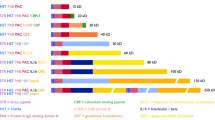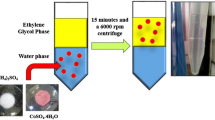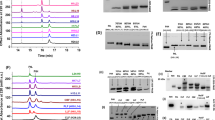Abstract
Newton and Bevis1 concentrated some animal viruses by adding zinc hydroxide to the virus suspension and afterwards dissolving the gel in saturated ethylenediamine tetraacetic acid solution in order to recover the virus. Attempts made in our laboratory to concentrate poliovirus by this method yielded unsatisfactory results.
This is a preview of subscription content, access via your institution
Access options
Subscribe to this journal
Receive 51 print issues and online access
$199.00 per year
only $3.90 per issue
Buy this article
- Purchase on Springer Link
- Instant access to full article PDF
Prices may be subject to local taxes which are calculated during checkout
Similar content being viewed by others
References
Newton, N., and Bevis, R., Virology, 8, 344 (1959).
Grossowicz, N., Mercado, A., and Goldblum, N., Proc. Soc. Exp. Biol. and Med., 103, 872 (1960).
Le Bouvier, G., Brit. J. Exp. Pathol., 40, 452 (1959).
Author information
Authors and Affiliations
Rights and permissions
About this article
Cite this article
HORODNICEANU, F., SERGIESCU, D., KLEIN, R. et al. Concentration and Partial Purification of Poliovirus by means of Zinc Hydroxide and Ion-exchanging Resin. Nature 193, 600–601 (1962). https://doi.org/10.1038/193600b0
Issue Date:
DOI: https://doi.org/10.1038/193600b0
Comments
By submitting a comment you agree to abide by our Terms and Community Guidelines. If you find something abusive or that does not comply with our terms or guidelines please flag it as inappropriate.



